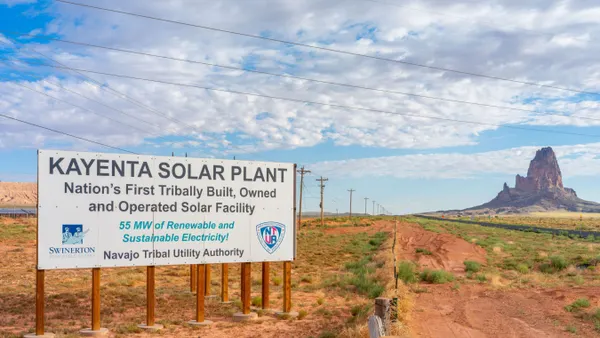Dive Brief:
- The House of Representatives has passed a $32.1 billion spending bill for the Department of Interior and U.S. Environmental Protection Agency, the first to come out of the lower chamber since 2009, the Hill reports.
- The bill would cut current funding by $64 million and is $1 billion less than the White House's budget proposal. It also includes measures to limit the EPA's oversight of power plants and seeks to block administration rules on water and coal mining.
- President Obama has indicated he would veto the measure if it reaches his desk as proposed, arguing that it cuts important energy investments and makes addressing climate change more difficult for states and businesses.
Dive Insight:
The House of Representatives has passed a spending bill that would cut investments in energy development and limit the EPA's oversight regarding power plants, coal and water. Derided by a hundred environmental organizations, the legislation is almost sure to be vetoed by President Obama.
"There is a great deal of concern over the number of regulatory actions being pursued by EPA in the absence of legislation and without clear congressional direction," Rep. Ken Calvert (R-Calif.) said during debate. "For this reason, the bill includes a number of provisions to stop unnecessary and damaging regulatory overreach by the agency."
But according to a July 11 veto threat issued by the White House, the spending bill's reduction in funds "would make it more difficult for States and businesses to plan and execute changes that would decrease carbon pollution and address the challenges facing the Nation from climate change."
And addressing the policy proposals, the White House added the bill includes "numerous highly unacceptable provisions that have no place in funding legislation."
Almost 100 advocacy groups called on lawmakers to reject the spending bills, including provisions that would require a reassessment of the use of social costs of carbon, which they say is a vital regulatory tool for accurately assessing health implications.
The groups, including Public Citizen and Greenpeace, say "the bill is filled with dozens of anti-environment policy riders that threaten our air, land, water and wildlife."
The groups have also criticized a section that would take steps to terminate the Programmatic Environmental Impact Statement for the federal coal leasing program. They say the move "would effectively block the crucial work of updating the antiquated federal coal program by forcing the Department of the Interior to conduct its review on an unrealistic timeline."














